Devops Engineer Resume Examples

Jul 18, 2024
|
12 min read
Master your DevOps engineer resume: how to streamline your skills, deploy your accomplishments, and optimize your job hunt for success.
Rated by 348 people
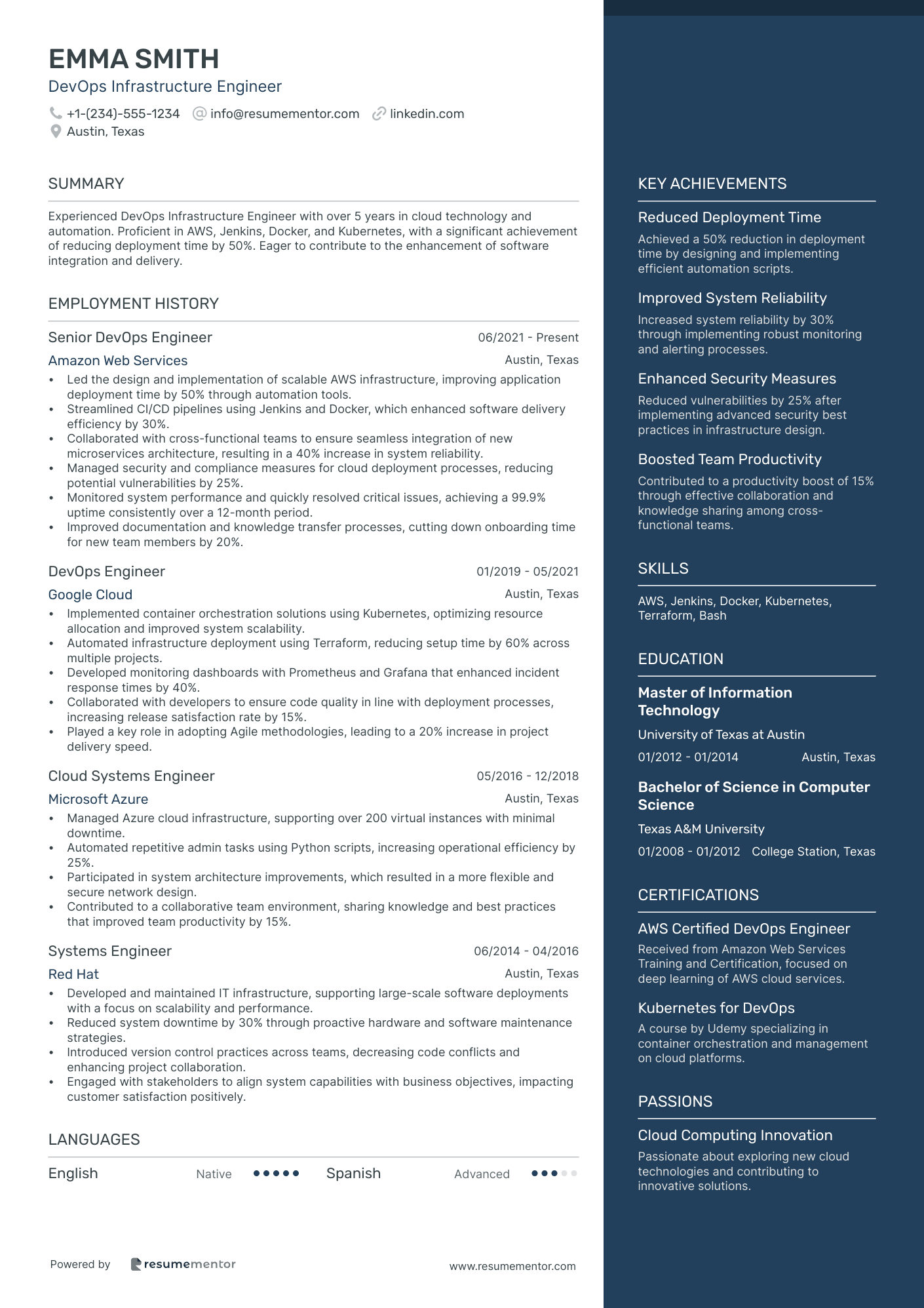
DevOps Infrastructure Engineer
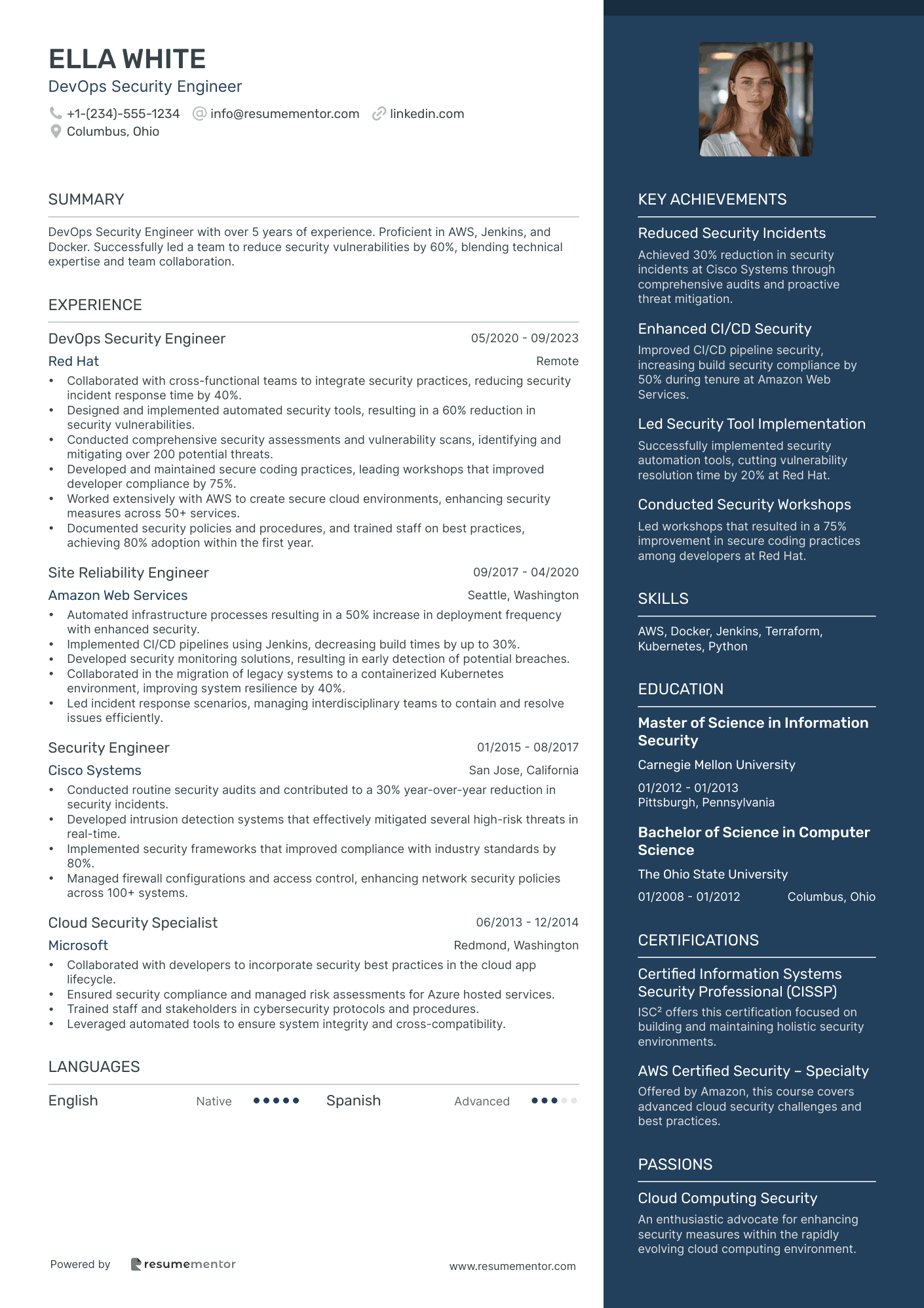
DevOps Security Engineer
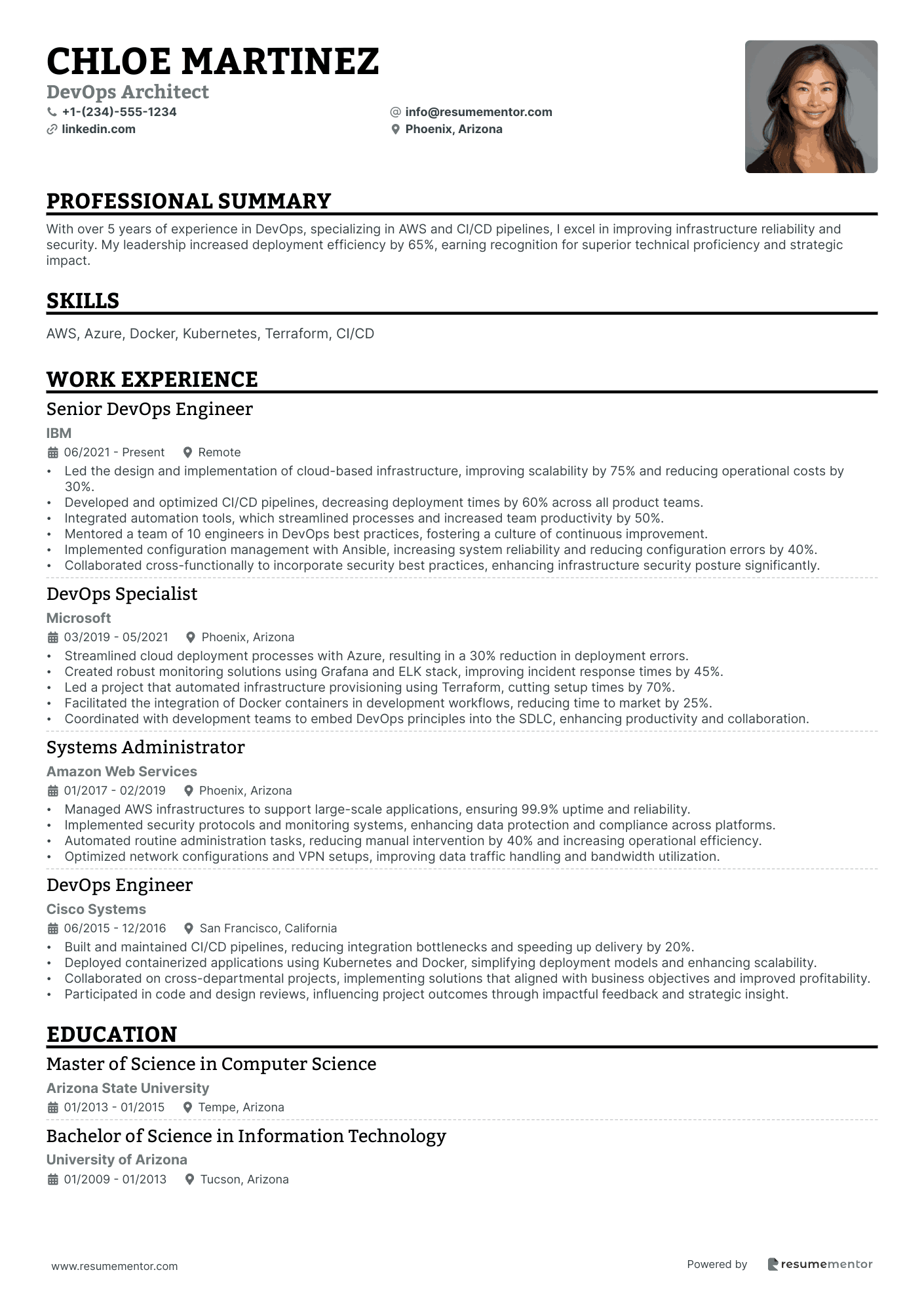
DevOps Architect
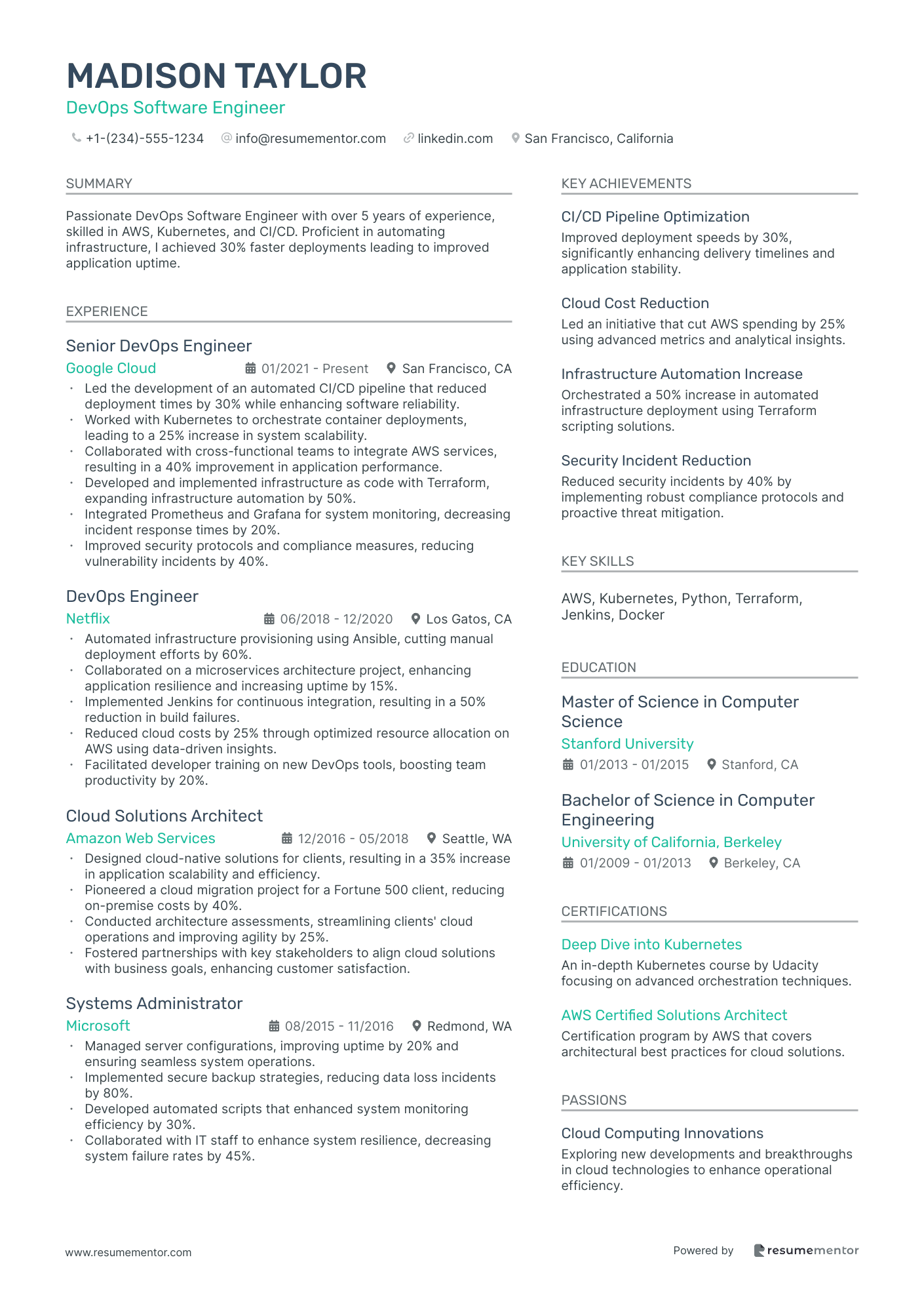
DevOps Software Engineer
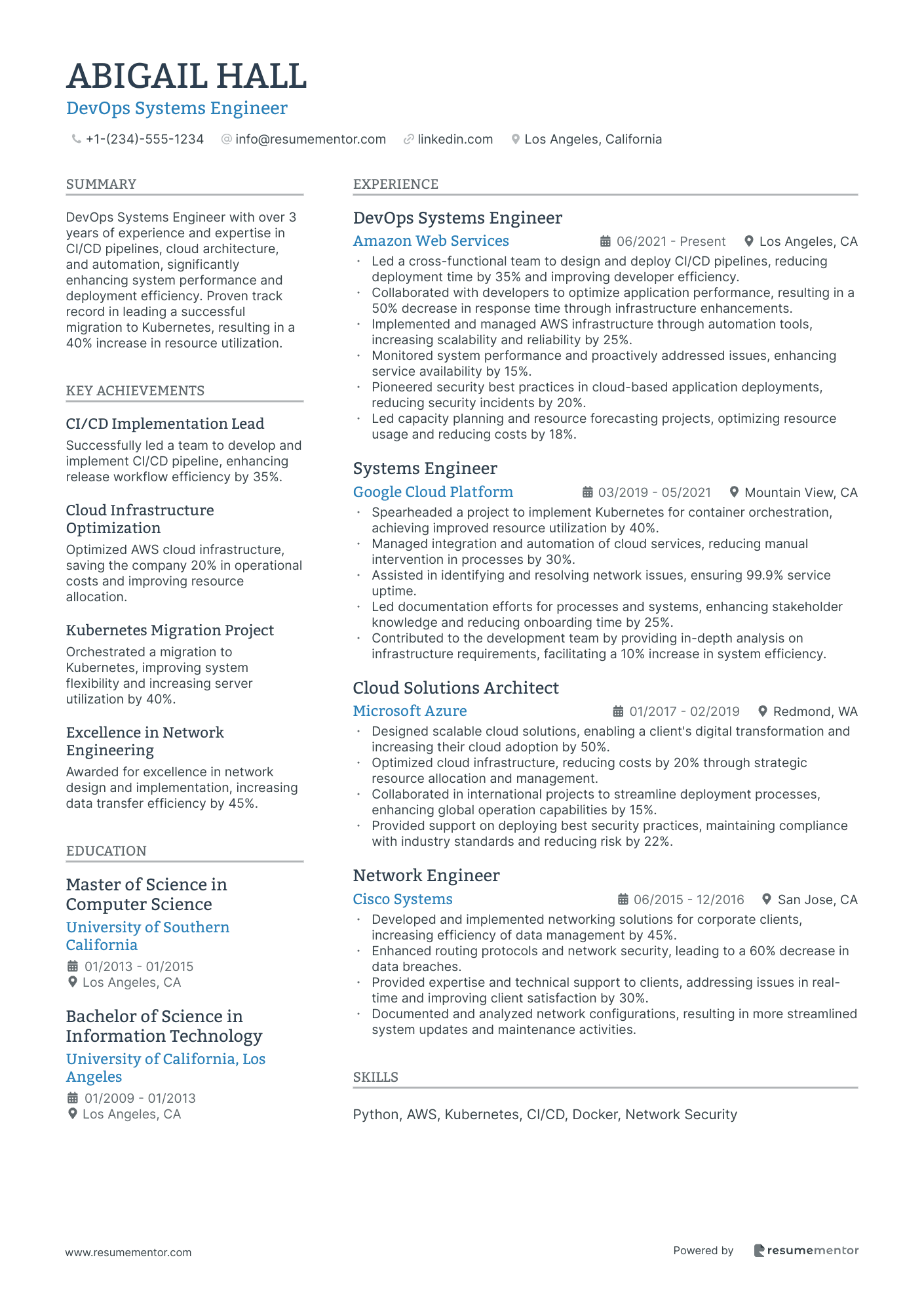
DevOps Systems Engineer
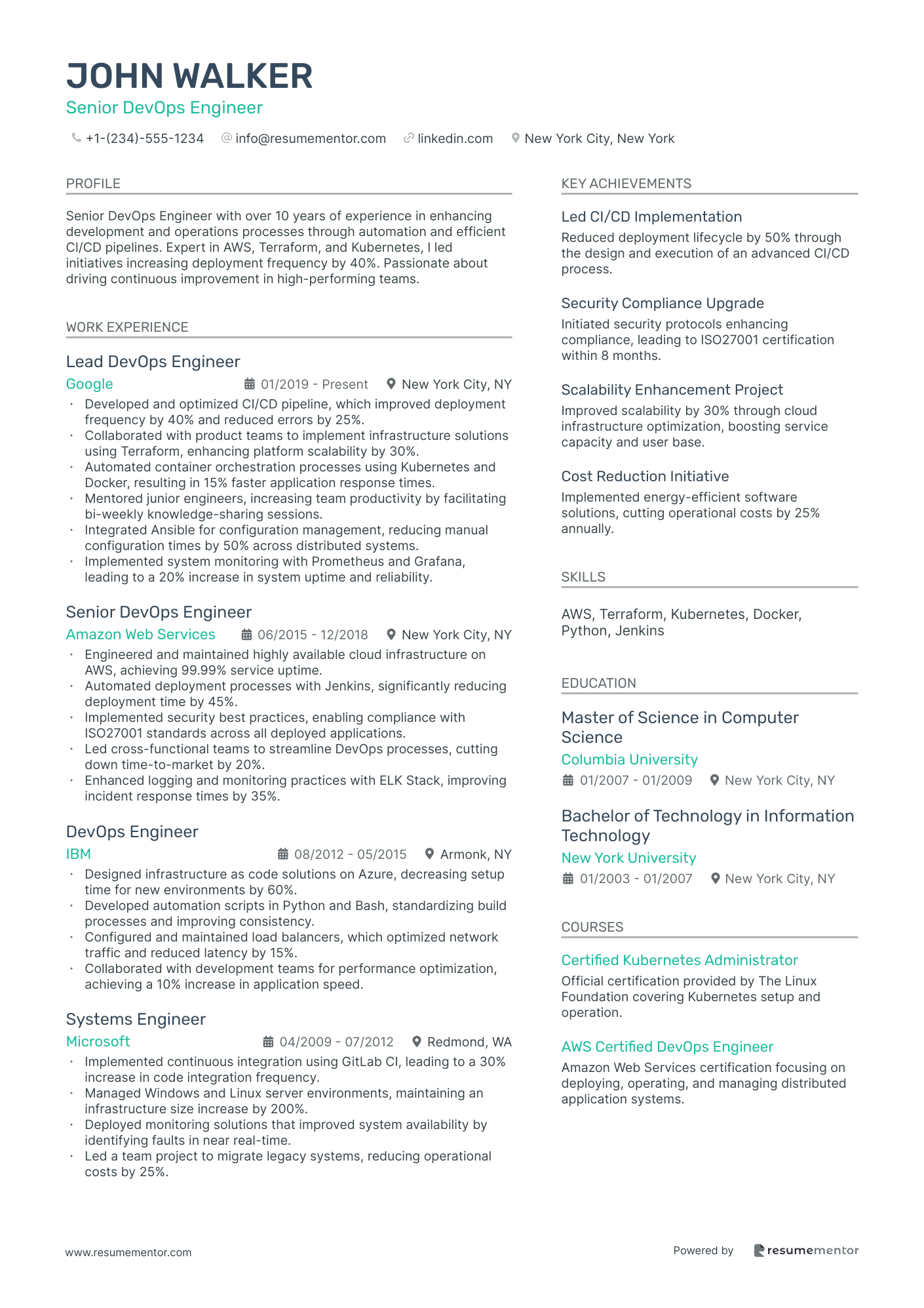
Senior DevOps Engineer
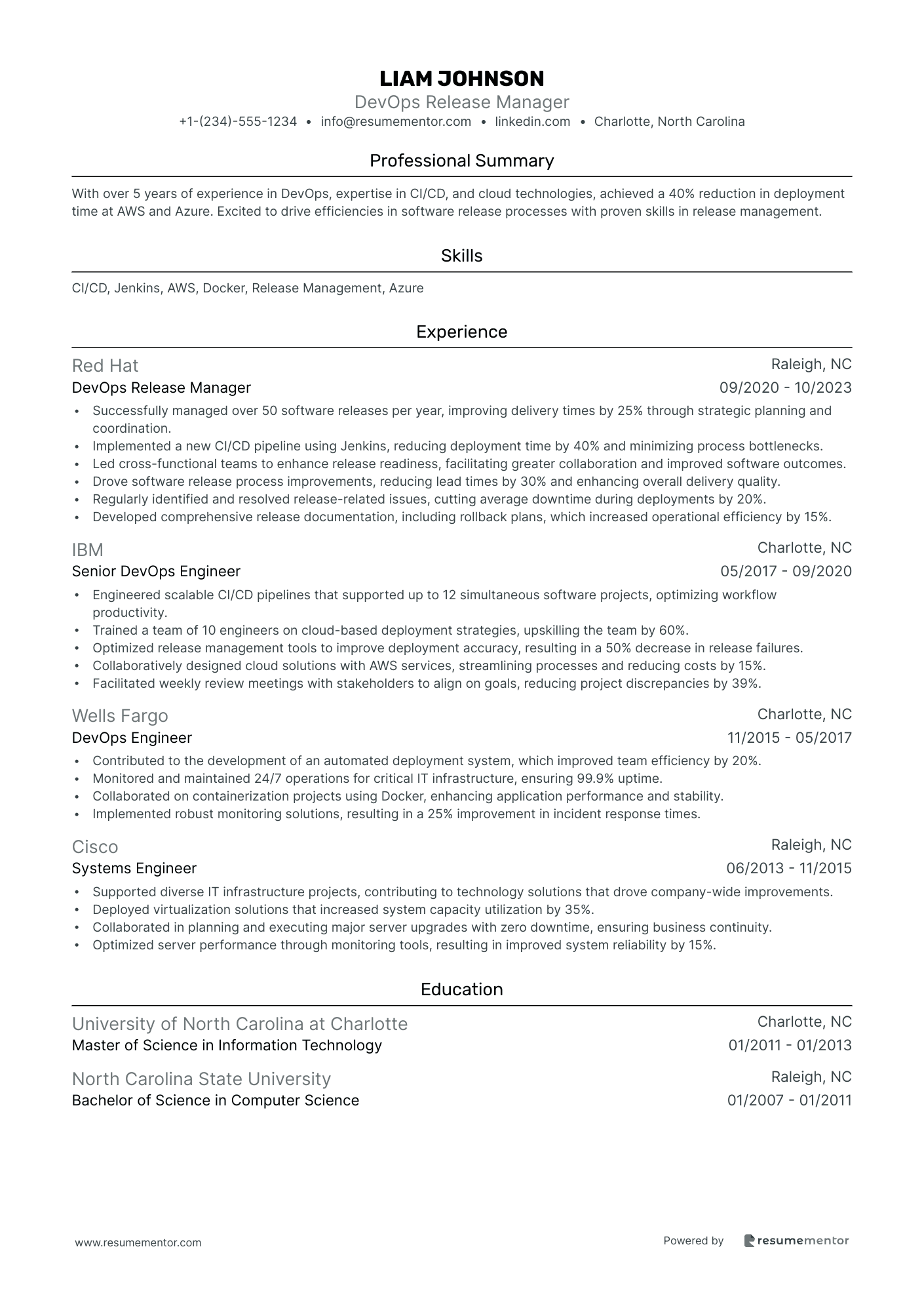
DevOps Release Manager
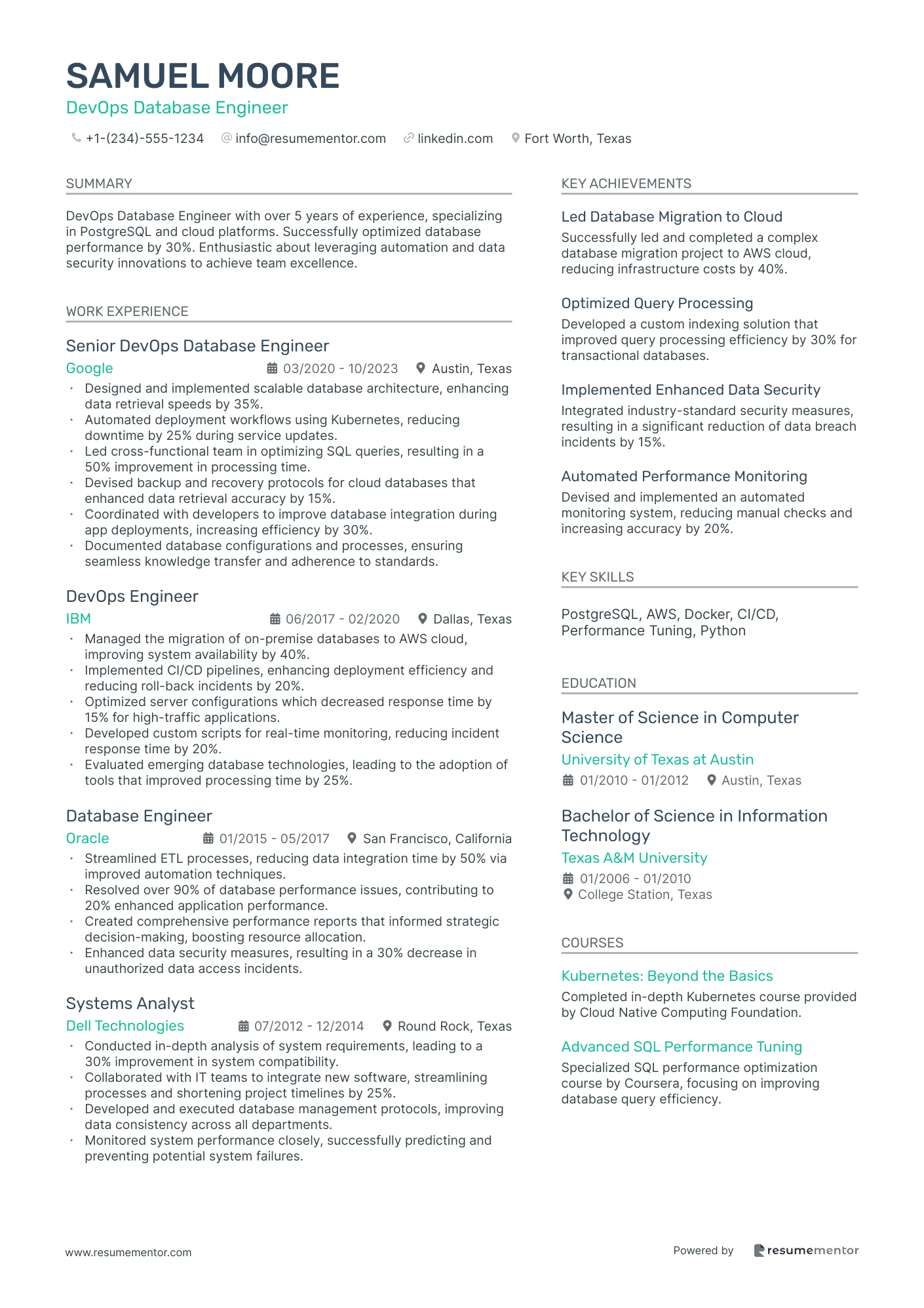
DevOps Database Engineer
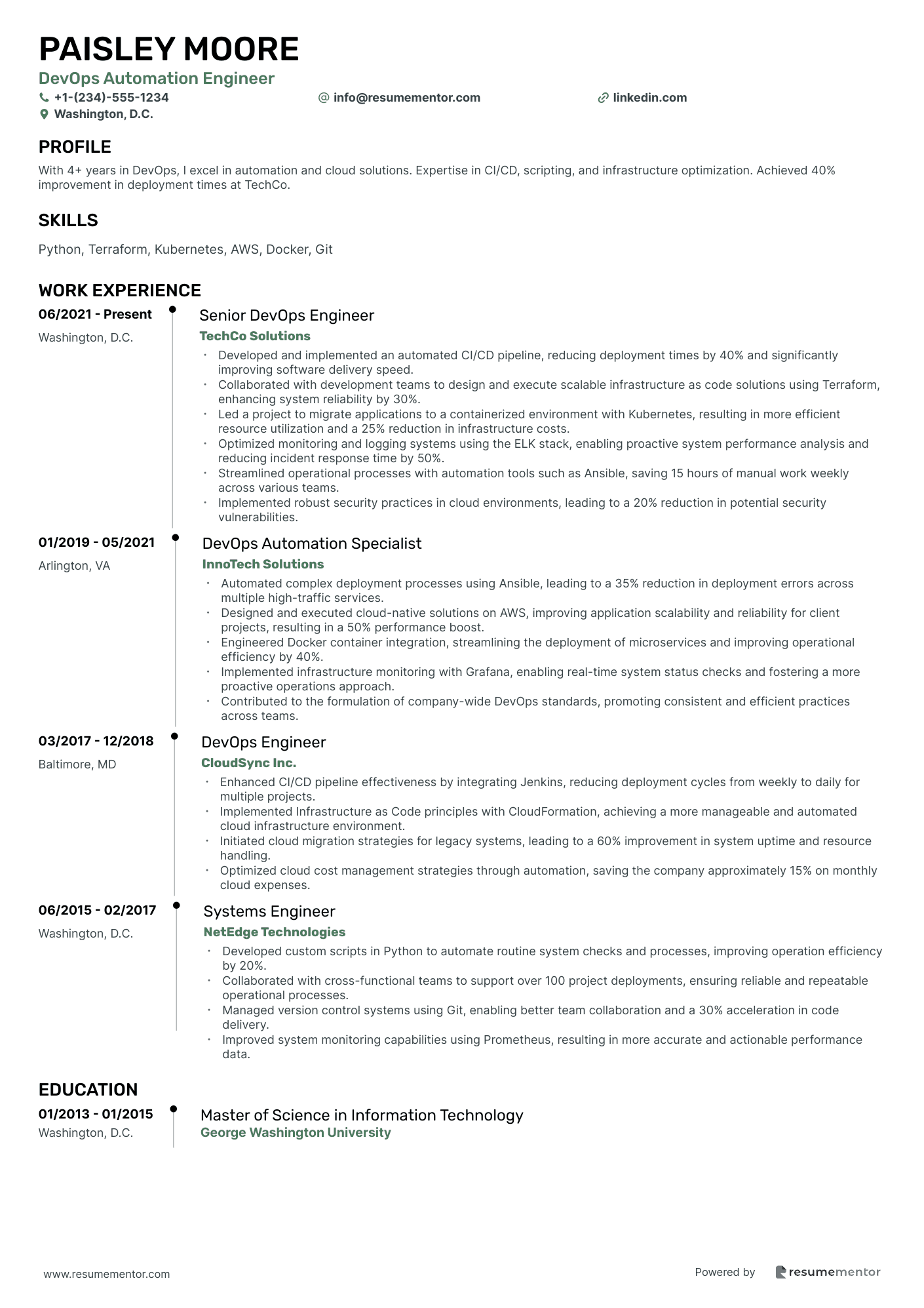
DevOps Automation Engineer

DevOps Infrastructure Engineer resume sample
- •Led the design and implementation of scalable AWS infrastructure, improving application deployment time by 50% through automation tools.
- •Streamlined CI/CD pipelines using Jenkins and Docker, which enhanced software delivery efficiency by 30%.
- •Collaborated with cross-functional teams to ensure seamless integration of new microservices architecture, resulting in a 40% increase in system reliability.
- •Managed security and compliance measures for cloud deployment processes, reducing potential vulnerabilities by 25%.
- •Monitored system performance and quickly resolved critical issues, achieving a 99.9% uptime consistently over a 12-month period.
- •Improved documentation and knowledge transfer processes, cutting down onboarding time for new team members by 20%.
- •Implemented container orchestration solutions using Kubernetes, optimizing resource allocation and improved system scalability.
- •Automated infrastructure deployment using Terraform, reducing setup time by 60% across multiple projects.
- •Developed monitoring dashboards with Prometheus and Grafana that enhanced incident response times by 40%.
- •Collaborated with developers to ensure code quality in line with deployment processes, increasing release satisfaction rate by 15%.
- •Played a key role in adopting Agile methodologies, leading to a 20% increase in project delivery speed.
- •Managed Azure cloud infrastructure, supporting over 200 virtual instances with minimal downtime.
- •Automated repetitive admin tasks using Python scripts, increasing operational efficiency by 25%.
- •Participated in system architecture improvements, which resulted in a more flexible and secure network design.
- •Contributed to a collaborative team environment, sharing knowledge and best practices that improved team productivity by 15%.
- •Developed and maintained IT infrastructure, supporting large-scale software deployments with a focus on scalability and performance.
- •Reduced system downtime by 30% through proactive hardware and software maintenance strategies.
- •Introduced version control practices across teams, decreasing code conflicts and enhancing project collaboration.
- •Engaged with stakeholders to align system capabilities with business objectives, impacting customer satisfaction positively.
DevOps Security Engineer resume sample
- •Collaborated with cross-functional teams to integrate security practices, reducing security incident response time by 40%.
- •Designed and implemented automated security tools, resulting in a 60% reduction in security vulnerabilities.
- •Conducted comprehensive security assessments and vulnerability scans, identifying and mitigating over 200 potential threats.
- •Developed and maintained secure coding practices, leading workshops that improved developer compliance by 75%.
- •Worked extensively with AWS to create secure cloud environments, enhancing security measures across 50+ services.
- •Documented security policies and procedures, and trained staff on best practices, achieving 80% adoption within the first year.
- •Automated infrastructure processes resulting in a 50% increase in deployment frequency with enhanced security.
- •Implemented CI/CD pipelines using Jenkins, decreasing build times by up to 30%.
- •Developed security monitoring solutions, resulting in early detection of potential breaches.
- •Collaborated in the migration of legacy systems to a containerized Kubernetes environment, improving system resilience by 40%.
- •Led incident response scenarios, managing interdisciplinary teams to contain and resolve issues efficiently.
- •Conducted routine security audits and contributed to a 30% year-over-year reduction in security incidents.
- •Developed intrusion detection systems that effectively mitigated several high-risk threats in real-time.
- •Implemented security frameworks that improved compliance with industry standards by 80%.
- •Managed firewall configurations and access control, enhancing network security policies across 100+ systems.
- •Collaborated with developers to incorporate security best practices in the cloud app lifecycle.
- •Ensured security compliance and managed risk assessments for Azure hosted services.
- •Trained staff and stakeholders in cybersecurity protocols and procedures.
- •Leveraged automated tools to ensure system integrity and cross-compatibility.
DevOps Architect resume sample
- •Led the design and implementation of cloud-based infrastructure, improving scalability by 75% and reducing operational costs by 30%.
- •Developed and optimized CI/CD pipelines, decreasing deployment times by 60% across all product teams.
- •Integrated automation tools, which streamlined processes and increased team productivity by 50%.
- •Mentored a team of 10 engineers in DevOps best practices, fostering a culture of continuous improvement.
- •Implemented configuration management with Ansible, increasing system reliability and reducing configuration errors by 40%.
- •Collaborated cross-functionally to incorporate security best practices, enhancing infrastructure security posture significantly.
- •Streamlined cloud deployment processes with Azure, resulting in a 30% reduction in deployment errors.
- •Created robust monitoring solutions using Grafana and ELK stack, improving incident response times by 45%.
- •Led a project that automated infrastructure provisioning using Terraform, cutting setup times by 70%.
- •Facilitated the integration of Docker containers in development workflows, reducing time to market by 25%.
- •Coordinated with development teams to embed DevOps principles into the SDLC, enhancing productivity and collaboration.
- •Managed AWS infrastructures to support large-scale applications, ensuring 99.9% uptime and reliability.
- •Implemented security protocols and monitoring systems, enhancing data protection and compliance across platforms.
- •Automated routine administration tasks, reducing manual intervention by 40% and increasing operational efficiency.
- •Optimized network configurations and VPN setups, improving data traffic handling and bandwidth utilization.
- •Built and maintained CI/CD pipelines, reducing integration bottlenecks and speeding up delivery by 20%.
- •Deployed containerized applications using Kubernetes and Docker, simplifying deployment models and enhancing scalability.
- •Collaborated on cross-departmental projects, implementing solutions that aligned with business objectives and improved profitability.
- •Participated in code and design reviews, influencing project outcomes through impactful feedback and strategic insight.
DevOps Software Engineer resume sample
- •Led the development of an automated CI/CD pipeline that reduced deployment times by 30% while enhancing software reliability.
- •Worked with Kubernetes to orchestrate container deployments, leading to a 25% increase in system scalability.
- •Collaborated with cross-functional teams to integrate AWS services, resulting in a 40% improvement in application performance.
- •Developed and implemented infrastructure as code with Terraform, expanding infrastructure automation by 50%.
- •Integrated Prometheus and Grafana for system monitoring, decreasing incident response times by 20%.
- •Improved security protocols and compliance measures, reducing vulnerability incidents by 40%.
- •Automated infrastructure provisioning using Ansible, cutting manual deployment efforts by 60%.
- •Collaborated on a microservices architecture project, enhancing application resilience and increasing uptime by 15%.
- •Implemented Jenkins for continuous integration, resulting in a 50% reduction in build failures.
- •Reduced cloud costs by 25% through optimized resource allocation on AWS using data-driven insights.
- •Facilitated developer training on new DevOps tools, boosting team productivity by 20%.
- •Designed cloud-native solutions for clients, resulting in a 35% increase in application scalability and efficiency.
- •Pioneered a cloud migration project for a Fortune 500 client, reducing on-premise costs by 40%.
- •Conducted architecture assessments, streamlining clients' cloud operations and improving agility by 25%.
- •Fostered partnerships with key stakeholders to align cloud solutions with business goals, enhancing customer satisfaction.
- •Managed server configurations, improving uptime by 20% and ensuring seamless system operations.
- •Implemented secure backup strategies, reducing data loss incidents by 80%.
- •Developed automated scripts that enhanced system monitoring efficiency by 30%.
- •Collaborated with IT staff to enhance system resilience, decreasing system failure rates by 45%.
DevOps Systems Engineer resume sample
- •Led a cross-functional team to design and deploy CI/CD pipelines, reducing deployment time by 35% and improving developer efficiency.
- •Collaborated with developers to optimize application performance, resulting in a 50% decrease in response time through infrastructure enhancements.
- •Implemented and managed AWS infrastructure through automation tools, increasing scalability and reliability by 25%.
- •Monitored system performance and proactively addressed issues, enhancing service availability by 15%.
- •Pioneered security best practices in cloud-based application deployments, reducing security incidents by 20%.
- •Led capacity planning and resource forecasting projects, optimizing resource usage and reducing costs by 18%.
- •Spearheaded a project to implement Kubernetes for container orchestration, achieving improved resource utilization by 40%.
- •Managed integration and automation of cloud services, reducing manual intervention in processes by 30%.
- •Assisted in identifying and resolving network issues, ensuring 99.9% service uptime.
- •Led documentation efforts for processes and systems, enhancing stakeholder knowledge and reducing onboarding time by 25%.
- •Contributed to the development team by providing in-depth analysis on infrastructure requirements, facilitating a 10% increase in system efficiency.
- •Designed scalable cloud solutions, enabling a client's digital transformation and increasing their cloud adoption by 50%.
- •Optimized cloud infrastructure, reducing costs by 20% through strategic resource allocation and management.
- •Collaborated in international projects to streamline deployment processes, enhancing global operation capabilities by 15%.
- •Provided support on deploying best security practices, maintaining compliance with industry standards and reducing risk by 22%.
- •Developed and implemented networking solutions for corporate clients, increasing efficiency of data management by 45%.
- •Enhanced routing protocols and network security, leading to a 60% decrease in data breaches.
- •Provided expertise and technical support to clients, addressing issues in real-time and improving client satisfaction by 30%.
- •Documented and analyzed network configurations, resulting in more streamlined system updates and maintenance activities.
Senior DevOps Engineer resume sample
- •Developed and optimized CI/CD pipeline, which improved deployment frequency by 40% and reduced errors by 25%.
- •Collaborated with product teams to implement infrastructure solutions using Terraform, enhancing platform scalability by 30%.
- •Automated container orchestration processes using Kubernetes and Docker, resulting in 15% faster application response times.
- •Mentored junior engineers, increasing team productivity by facilitating bi-weekly knowledge-sharing sessions.
- •Integrated Ansible for configuration management, reducing manual configuration times by 50% across distributed systems.
- •Implemented system monitoring with Prometheus and Grafana, leading to a 20% increase in system uptime and reliability.
- •Engineered and maintained highly available cloud infrastructure on AWS, achieving 99.99% service uptime.
- •Automated deployment processes with Jenkins, significantly reducing deployment time by 45%.
- •Implemented security best practices, enabling compliance with ISO27001 standards across all deployed applications.
- •Led cross-functional teams to streamline DevOps processes, cutting down time-to-market by 20%.
- •Enhanced logging and monitoring practices with ELK Stack, improving incident response times by 35%.
- •Designed infrastructure as code solutions on Azure, decreasing setup time for new environments by 60%.
- •Developed automation scripts in Python and Bash, standardizing build processes and improving consistency.
- •Configured and maintained load balancers, which optimized network traffic and reduced latency by 15%.
- •Collaborated with development teams for performance optimization, achieving a 10% increase in application speed.
- •Implemented continuous integration using GitLab CI, leading to a 30% increase in code integration frequency.
- •Managed Windows and Linux server environments, maintaining an infrastructure size increase by 200%.
- •Deployed monitoring solutions that improved system availability by identifying faults in near real-time.
- •Led a team project to migrate legacy systems, reducing operational costs by 25%.
DevOps Release Manager resume sample
- •Successfully managed over 50 software releases per year, improving delivery times by 25% through strategic planning and coordination.
- •Implemented a new CI/CD pipeline using Jenkins, reducing deployment time by 40% and minimizing process bottlenecks.
- •Led cross-functional teams to enhance release readiness, facilitating greater collaboration and improved software outcomes.
- •Drove software release process improvements, reducing lead times by 30% and enhancing overall delivery quality.
- •Regularly identified and resolved release-related issues, cutting average downtime during deployments by 20%.
- •Developed comprehensive release documentation, including rollback plans, which increased operational efficiency by 15%.
- •Engineered scalable CI/CD pipelines that supported up to 12 simultaneous software projects, optimizing workflow productivity.
- •Trained a team of 10 engineers on cloud-based deployment strategies, upskilling the team by 60%.
- •Optimized release management tools to improve deployment accuracy, resulting in a 50% decrease in release failures.
- •Collaboratively designed cloud solutions with AWS services, streamlining processes and reducing costs by 15%.
- •Facilitated weekly review meetings with stakeholders to align on goals, reducing project discrepancies by 39%.
- •Contributed to the development of an automated deployment system, which improved team efficiency by 20%.
- •Monitored and maintained 24/7 operations for critical IT infrastructure, ensuring 99.9% uptime.
- •Collaborated on containerization projects using Docker, enhancing application performance and stability.
- •Implemented robust monitoring solutions, resulting in a 25% improvement in incident response times.
- •Supported diverse IT infrastructure projects, contributing to technology solutions that drove company-wide improvements.
- •Deployed virtualization solutions that increased system capacity utilization by 35%.
- •Collaborated in planning and executing major server upgrades with zero downtime, ensuring business continuity.
- •Optimized server performance through monitoring tools, resulting in improved system reliability by 15%.
DevOps Database Engineer resume sample
- •Designed and implemented scalable database architecture, enhancing data retrieval speeds by 35%.
- •Automated deployment workflows using Kubernetes, reducing downtime by 25% during service updates.
- •Led cross-functional team in optimizing SQL queries, resulting in a 50% improvement in processing time.
- •Devised backup and recovery protocols for cloud databases that enhanced data retrieval accuracy by 15%.
- •Coordinated with developers to improve database integration during app deployments, increasing efficiency by 30%.
- •Documented database configurations and processes, ensuring seamless knowledge transfer and adherence to standards.
- •Managed the migration of on-premise databases to AWS cloud, improving system availability by 40%.
- •Implemented CI/CD pipelines, enhancing deployment efficiency and reducing roll-back incidents by 20%.
- •Optimized server configurations which decreased response time by 15% for high-traffic applications.
- •Developed custom scripts for real-time monitoring, reducing incident response time by 20%.
- •Evaluated emerging database technologies, leading to the adoption of tools that improved processing time by 25%.
- •Streamlined ETL processes, reducing data integration time by 50% via improved automation techniques.
- •Resolved over 90% of database performance issues, contributing to 20% enhanced application performance.
- •Created comprehensive performance reports that informed strategic decision-making, boosting resource allocation.
- •Enhanced data security measures, resulting in a 30% decrease in unauthorized data access incidents.
- •Conducted in-depth analysis of system requirements, leading to a 30% improvement in system compatibility.
- •Collaborated with IT teams to integrate new software, streamlining processes and shortening project timelines by 25%.
- •Developed and executed database management protocols, improving data consistency across all departments.
- •Monitored system performance closely, successfully predicting and preventing potential system failures.
DevOps Automation Engineer resume sample
- •Developed and implemented an automated CI/CD pipeline, reducing deployment times by 40% and significantly improving software delivery speed.
- •Collaborated with development teams to design and execute scalable infrastructure as code solutions using Terraform, enhancing system reliability by 30%.
- •Led a project to migrate applications to a containerized environment with Kubernetes, resulting in more efficient resource utilization and a 25% reduction in infrastructure costs.
- •Optimized monitoring and logging systems using the ELK stack, enabling proactive system performance analysis and reducing incident response time by 50%.
- •Streamlined operational processes with automation tools such as Ansible, saving 15 hours of manual work weekly across various teams.
- •Implemented robust security practices in cloud environments, leading to a 20% reduction in potential security vulnerabilities.
- •Automated complex deployment processes using Ansible, leading to a 35% reduction in deployment errors across multiple high-traffic services.
- •Designed and executed cloud-native solutions on AWS, improving application scalability and reliability for client projects, resulting in a 50% performance boost.
- •Engineered Docker container integration, streamlining the deployment of microservices and improving operational efficiency by 40%.
- •Implemented infrastructure monitoring with Grafana, enabling real-time system status checks and fostering a more proactive operations approach.
- •Contributed to the formulation of company-wide DevOps standards, promoting consistent and efficient practices across teams.
- •Enhanced CI/CD pipeline effectiveness by integrating Jenkins, reducing deployment cycles from weekly to daily for multiple projects.
- •Implemented Infrastructure as Code principles with CloudFormation, achieving a more manageable and automated cloud infrastructure environment.
- •Initiated cloud migration strategies for legacy systems, leading to a 60% improvement in system uptime and resource handling.
- •Optimized cloud cost management strategies through automation, saving the company approximately 15% on monthly cloud expenses.
- •Developed custom scripts in Python to automate routine system checks and processes, improving operation efficiency by 20%.
- •Collaborated with cross-functional teams to support over 100 project deployments, ensuring reliable and repeatable operational processes.
- •Managed version control systems using Git, enabling better team collaboration and a 30% acceleration in code delivery.
- •Improved system monitoring capabilities using Prometheus, resulting in more accurate and actionable performance data.
As a DevOps engineer, you’re the maestro orchestrating a symphony of code, infrastructure, and collaboration, and to secure your ideal role, your resume needs to reflect that harmony. However, turning your vast array of skills and technical expertise into a compelling narrative can feel like navigating a complex web.
Just like you rely on blueprints when tackling intricate projects, a structured approach to your resume can simplify this challenge. Using a resume template as a guide can help you organize your strengths and present them clearly and effectively, providing a solid foundation that ensures your unique abilities shine through.
When crafting your resume, focus on how your skills translate into tangible value. Hiring managers are eager to see how you’ve resolved complex issues, automated processes, or improved efficiency in past roles. Every bullet point should tell a story of innovation and reliability, much like the seamless code you deploy every day.
Begin your journey by exploring available resume templates, which serve as a roadmap to highlight your essential experiences. With a well-crafted resume in hand, you'll be well-prepared and confident as you embark on your job search adventure.
Key Takeaways
- Your resume should effectively communicate your skills in automating processes, managing software lifecycles, and ensuring system reliability, as these are crucial for operations in DevOps roles.
- Begin your resume with a professional presentation of your contact information, a strong professional summary, and a list of relevant skills that align with the job description to grab the attention of hiring managers.
- Detail your work experience by focusing on the tangible impact of your achievements, using quantifiable metrics to demonstrate your contributions and aligning them with problem-solving and technical expertise.
- Highlight your education by including only relevant degrees or certifications, such as AWS Certified DevOps Engineer, which demonstrate your qualification and commitment to the field.
- Include additional sections like certificates, language proficiency, and volunteer work to present a well-rounded image of your skills and interests, further enhancing your appeal as a candidate.
What to focus on when writing your devops engineer resume
Your DevOps engineer resume should clearly convey your skills in automating processes, managing software lifecycles, and ensuring system reliability. These abilities demonstrate your effectiveness in bridging the gap between software development and IT operations, crucial for streamlining continuous integration and deployment. Beyond technical expertise, your resume should also reflect your problem-solving skills and your ability to work collaboratively within diverse teams to achieve business goals.
How to structure your devops engineer resume
- Contact Information — Start with your full name, phone number, email address, and LinkedIn profile to ensure recruiters can easily reach you. A professional presentation here sets the tone for the rest of the resume by showing attention to detail and accessibility with your LinkedIn profile reinforcing your professional brand and network within the industry, which can be a valuable asset to potential employers.
- Professional Summary — Offer a snapshot of your experience with DevOps tools like Jenkins, Docker, Kubernetes, and AWS. By highlighting achievements such as reducing deployment time or boosting system reliability, you immediately grab the recruiter's attention, building an initial impression that you are both skilled and results-oriented. Tailoring this section to align with the specific requirements of the job description can further enhance its impact.
- Skills — Expand on your technical know-how by listing skills in configuration management, scripting languages like Python or Bash, and cloud platforms such as AWS, Azure, or GCP. Also, mention your proficiency with monitoring tools, connecting this to the efficiency of CI/CD pipelines. Including relevant soft skills, such as communication or adaptability, can also highlight your ability to integrate effectively within cross-functional teams.
- Work Experience — Use bullet points to detail your previous roles, focusing on how you’ve automated workflows, enhanced team collaboration, and streamlined deployment processes. These experiences illustrate your practical impact in real-world settings and show your growth and adaptability in your career. Quantifying your achievements whenever possible can make each bullet point more compelling and credible.
- Education — Include your degrees and any relevant certifications, such as AWS Certified DevOps Engineer or Docker Certified Associate, which underscore your formal qualifications and ongoing commitment to learning. Highlighting courses or projects during your education that are relevant to DevOps shows your long-term interest and foundational knowledge in the field.
- Projects — Highlight specific projects where your contribution in automating infrastructure or optimizing cloud deployments led to measurable results like reduced downtime or cost savings. These examples solidify your expertise with tangible outcomes and offer concrete evidence of your problem-solving capabilities. Emphasizing a project’s impact, scope, and any innovative approaches used can further distinguish your experiences from other candidates.
As we explore each section more in-depth below, we'll address how to format your resume to best showcase your skills and experiences. This will ensure your document is not only informative but also structured to pass through Applicant Tracking Systems effectively.
Which resume format to choose
As a devops engineer, crafting a strong resume is crucial for standing out in the tech industry. Start by using a reverse-chronological format to highlight your most recent experience first. This approach allows employers to quickly grasp your career trajectory and technical skills, which are often top priorities in tech roles.
When it comes to font selection, opt for modern choices like Rubik, Lato, or Montserrat. These fonts maintain a clean and professional appearance, ensuring that your resume reflects current design standards without distracting from your content. Avoiding older fonts like Arial and Times New Roman helps your resume maintain a fresh and up-to-date look that aligns with the innovation-driven nature of the devops field.
Saving your resume as a PDF is essential for maintaining your chosen formatting across different devices, which is critical in presenting a professional and consistent image to potential employers. This format preserves your text alignment and design elements, so what recruiters see is exactly what you intended.
Pay attention to margins by keeping them around 1 inch. This not only provides a neat and organized layout but also ensures ample whitespace to improve readability. Proper margins help balance the technical details with visual appeal, making it easy for recruiters to skim through your key accomplishments and skills.
Bringing these elements together helps you present a resume that effectively showcases your skills and experience with a polished, contemporary style, crucial for making a lasting impression in the competitive tech space.
How to write a quantifiable resume experience section
The experience section of your DevOps engineer resume is your chance to highlight the impact you’ve made in your roles. Focus on achievements that showcase how you've helped past employers succeed. Start with your most recent jobs, listing them in reverse chronological order. Tailor each entry to the job you're applying for by using language from the job listing. Prioritize relevant job titles and include positions from the last 10-15 years, emphasizing roles that showcase your best skills. Use strong action words like "implemented," "optimized," and "automated" to illustrate your contributions effectively.
Here's a compelling example in JSON format:
- •Boosted deployment frequency by 40% with CI/CD pipeline automation.
- •Cut infrastructure costs by 30% through smart resource management.
- •Improved system monitoring, cutting incidents by 50% with alerts.
- •Led teams to streamline processes, increasing efficiency by 25%.
This section effectively delivers your achievements in a concise, impactful manner. The use of strong action verbs like "boosted" and "cut" naturally lead the reader to focus on the results, providing clear examples of how you’ve contributed to business goals. Each bullet point not only highlights a specific achievement but also ties directly back to the skills and results potential employers are looking for. The structure ensures that your accomplishments are easily digestible, with each sentence building on the value you offer as a candidate.
Achievement-Focused resume experience section
A DevOps-focused engineer resume experience section should emphasize achievements rather than just listing duties. Highlight specific accomplishments and quantify them to give context to your impact. Mention the tools and technologies you used, as this adds depth to your work. Reflect on the challenges you faced and how you overcame them, showcasing your role in elevating efficiency, reliability, and teamwork within your organization.
Each bullet point should weave a narrative of how your problem-solving abilities and technical expertise contributed positively. Use strong action verbs to bring attention to your contributions and their positive outcomes. This strategy not only illustrates your abilities but also helps potential employers envision the value you could add to their team.
DevOps Engineer
Tech Innovations Inc.
March 2020 - Present
- Deployed a CI/CD pipeline that reduced software deployment time by 40%, using Jenkins and Docker.
- Implemented infrastructure as code with Terraform, boosting system provisioning speed by 30%.
- Teamed up with development and QA teams to raise the deployment success rate by 25%.
- Optimized monitoring processes with Prometheus, cutting incident response time by 50%.
Innovation-Focused resume experience section
An innovation-focused DevOps Engineer resume experience section should effectively showcase your ability to bring creative solutions to complex challenges. Emphasize how you have used inventive approaches to drive improvements in your role. Highlight specific examples that demonstrate your problem-solving skills and teamwork. Detail the outcomes of your efforts, such as enhanced efficiency or cost savings, tying them to the needs of the employer. Tailor your experiences to align with the job description, underscoring relevant skills.
Begin with your most recent or pertinent position, and outline your key achievements. Present these accomplishments clearly using bullet points, starting each with impact-oriented action verbs like "developed," "implemented," or "led." Keep your descriptions concise, focusing on the results, such as cutting deployment times by 30%. Use metrics to illustrate the concrete impact of your work, engaging hiring managers with measurable achievements.
DevOps Engineer
Tech Innovations Inc.
Jan 2020 - Present
- Developed a new CI/CD pipeline that reduced deployment times by 40%, increasing team productivity.
- Implemented automated testing frameworks, decreasing errors in production releases by 25%.
- Led a cross-functional team to migrate legacy systems to a microservices architecture, enhancing scalability.
- Introduced containerization strategies, improving application portability and deployment speed.
Project-Focused resume experience section
A project-focused DevOps engineer resume experience section should clearly highlight how you contribute to and impact key initiatives. Begin by detailing the specific projects you've worked on, emphasizing the tools and techniques you applied. Illustrate the technical environments involved, such as cloud platforms or CI/CD practices, to set the stage for your problem-solving skills. Showcase how you drove improvements or brought innovation to your roles, making sure each point builds on the last.
Use quantifiable outcomes to capture your achievements, like cutting deployment times or boosting system reliability, and tie these results directly to your actions. If you took on leadership roles, such as guiding a team or coordinating with other departments, mention these to paint a fuller picture of your responsibilities. With active language, articulate the impact you made, following up with how those results were achieved. This cohesive approach will effectively demonstrate your abilities and the value you bring.
DevOps Engineer
Tech Solutions Inc.
June 2020 - Present
- Reduced cloud costs by 30% through optimization of instances and storage solutions.
- Designed and implemented a CI/CD pipeline, decreasing deployment time by 50%.
- Led a team of 4 engineers to migrate applications to Docker containers, improving scalability.
- Increased application uptime to 99.9% by introducing infrastructure monitoring tools.
Problem-Solving Focused resume experience section
A problem-solving-focused DevOps engineer resume experience section should clearly demonstrate your ability to navigate complex challenges. Begin by identifying specific obstacles you faced in your previous roles, and explain the solutions you crafted to overcome them. This approach helps to highlight the tangible benefits of your work, such as improvements in speed, efficiency, or scalability. Use straightforward language and make sure your achievements are accessible to all readers, regardless of their technical background.
To make your experiences resonate, emphasize the skills and technologies that were crucial in solving these problems, and adjust the details to match the job you are targeting. Show how your proactive mindset and teamwork led to successful outcomes. These facets not only underline your problem-solving prowess but also strengthen your case as an ideal candidate for the role.
DevOps Engineer
Tech Solutions Inc.
June 2020 - Present
- Cut deployment time in half by setting up Jenkins CI/CD pipelines.
- Fixed a server downtime issue, raising uptime to 99.9% through network reconfiguration.
- Saved the team 20 hours monthly by automating maintenance tasks with Python scripts.
- Introduced monitoring tools that slashed incident response time by 40%.
Write your devops engineer resume summary section
A results-focused DevOps engineer resume summary should highlight your key skills and achievements in a way that aligns with the role you’re aiming for. This is about showcasing how your expertise can benefit the company using clear and straightforward language. For those with experience, your summary might be crafted like this:
Starting with years of experience sets a strong foundation, and measurable achievements like performance improvements add credibility. This flows naturally into expressing your passion for efficiency and technology. For those starting their careers, an objective might serve you better:
[here was the JSON object 2]
Here, enthusiasm and eagerness to learn create a solid starting point, while foundational skills connect directly to the desire for growth and teamwork. Knowing the difference between a resume summary and an objective is crucial. The summary gives a snapshot of your skills and achievements, ideal for experienced candidates. The objective, on the other hand, is for newcomers, showcasing your career aims and readiness to grow. Meanwhile, a resume profile offers a personal touch, potentially including your work philosophy. A summary of qualifications lists skills succinctly. Your approach should reflect your experience level and the specific job you’re targeting, ensuring your resume makes a strong impression.
Listing your devops engineer skills on your resume
A skills-focused DevOps engineer resume section should effectively capture the attention of potential employers. You have the option to create a standalone section for your skills or blend them into your experience and summary areas. Be sure to include your strengths and essential soft skills, such as teamwork and problem-solving. Hard skills, which are your technical abilities like cloud computing and scripting languages, are crucial to highlight.
The inclusion of specific skills and strengths acts as keywords in your resume. These keywords help your application get noticed and pass through applicant tracking systems effectively. Aligning your skills with the job description showcases your suitability for the role.
A well-crafted standalone skills section emphasizes specific, relevant abilities directly tied to the job requirements. The example above is effective because it’s concise and focuses on crucial DevOps industry skills, making you appear as a strong candidate.
Best hard skills to feature on your devops engineer resume
Highlighting hard skills that prove you can perform the technical tasks of a DevOps role is vital. These skills communicate readiness for the role’s specific demands. Here are key hard skills to feature:
Hard Skills
- Cloud Computing
- Continuous Integration/Continuous Deployment (CI/CD)
- Infrastructure as Code (IaC)
- Scripting (e.g., Python, Bash)
- Docker & Containerization
- Monitoring & Logging Tools
- Configuration Management
- Version Control Systems (e.g., Git)
- Network Protocols and Security
- Kubernetes
- AWS/GCP/Azure Services
- Automation Tools
- System Administration
- Linux/Unix Systems
- Database Management
Best soft skills to feature on your devops engineer resume
As important as hard skills, soft skills enable effective work within teams and efficient problem-solving. These skills show how well you function in a work environment. Valuable soft skills to include are:
Soft Skills
- Communication
- Problem Solving
- Adaptability
- Teamwork
- Attention to Detail
- Time Management
- Leadership
- Conflict Resolution
- Critical Thinking
- Creativity
- Initiative
- Patience
- Stress Management
- Decision Making
- Organizational Skills
How to include your education on your resume
The education section is a key part of any resume, including for a DevOps engineer. It gives potential employers a quick glance at your academic background and its relevance to the job you want. This section should be crafted carefully, highlighting education that aligns with your target position. If you have coursework or degrees that do not connect with DevOps, exclude them. You should include details like your GPA if it's impressive, typically above 3.5. If you graduate cum laude or with other honors, add this detail to showcase your achievements. When listing your degree, include the full title, the institution name, and the dates attended.
Now, compare the following examples. The first one makes several mistakes, misguiding the reader.
In this incorrect example, the education is unrelated to DevOps, and the GPA is neither strong nor accompanied by any honors.
Here's a well-crafted example:
- •Graduated cum laude
This example strengthens your candidacy by emphasizing relevant education and achievements. It shows dedication and success in fields pertinent to DevOps engineering. The GPA of 3.8 signifies strong academic performance, and the cum laude distinction further elevates credibility. Presenting information clearly ensures employers focus on what matters most for the role you're applying for, boosting your chances of making a great impression.
How to include devops engineer certificates on your resume
Including a certificates section in your resume is crucial for a DevOps engineer. List the name of each certificate clearly. Include the date you received it. Add the issuing organization to provide credibility. Certificates can also be displayed in the header to catch the recruiter’s eye immediately.
Here is an example of how to include certificates in the header:
A good example of a standalone certificates section would look like this: [here was the JSON object 2]
This example is strong because it includes relevant certificates that showcase your expertise in DevOps. These certifications are well-recognized in the industry and demonstrate your skills and commitment. Having the issuer’s name adds authenticity and makes the section more professional. Make sure your certificates are up-to-date to reflect continuous learning and relevance in the field.
Extra sections to include in your devops engineer resume
In today’s competitive job market, a strong resume is crucial for landing your dream devops engineer role. To stand out, you should consider including sections that highlight various aspects of your skills, interests, and experiences.
Language section — Highlight your proficiency in languages that are relevant to your job role. This can show your cross-functional capabilities and cater to international projects.
Hobbies and interests section — Share hobbies that demonstrate relevant soft skills like problem-solving or teamwork. This provides a glimpse into your personality and can make you more relatable to recruiters.
Volunteer work section — Include any volunteer experiences that showcase your leadership or technical skills. This can reflect your commitment to community and your ability to go above and beyond in any role.
Books section — Mention books you’ve read that relate to devops, technology, or professional development. This shows your dedication to continuous learning and staying updated with industry trends.
By incorporating these sections, you not only enhance your resume's appeal but also create a balanced portrait of yourself as a well-rounded candidate. This helps you connect better with potential employers and improve your chances of landing interviews.
In Conclusion
In conclusion, crafting a DevOps engineer resume involves more than just listing skills or past jobs. It's about storytelling, presenting your journey in a way that resonates with recruiters and distinguishes you from the competition. By structuring your resume to reflect your strengths, achievements, and problem-solving capabilities, you effectively showcase the value you bring to potential employers. Pay attention to every detail, from fonts and formats to quantifying experiences with metrics that highlight your impact. Tailoring your resume to each opportunity by using relevant keywords and aligning with job descriptions increases your chances of catching the eyes of hiring managers.
Furthermore, consider incorporating additional sections that provide a well-rounded view of your abilities and interests. Sharing insights into languages you speak, books you've read, or volunteer work you've done, paints a fuller picture of your character and dedication. These elements not only make your resume more engaging but also reflect your commitment to ongoing learning and community involvement.
By following the guidances on format, content, and structure outlined in this article, your resume will serve as a polished and effective tool in your job search toolkit. Each section, thoughtfully crafted, will help align your aspirations with those of employers eager to find dedicated and innovative DevOps professionals. Equipped with this well-rounded resume, you'll step confidently into interviews, ready to discuss the unique talents and perspectives you bring to the fast-paced world of DevOps.
Related Articles

Continue Reading
Check more recommended readings to get the job of your dreams.
Resume
Resources
Tools
© 2026. All rights reserved.
Made with love by people who care.

